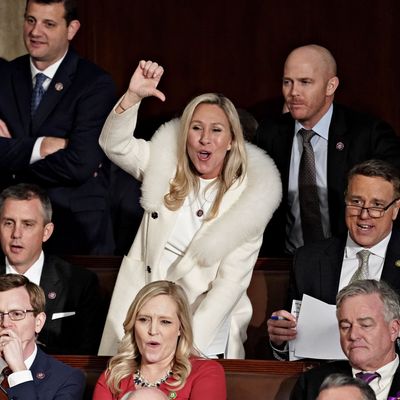
Americans have long admired the raucous debate in the British Parliament. John McCain even ran for president promising to bring Prime Minister’s Questions to the United States. On Tuesday, at President Joe Biden’s State of the Union, America got a window into what that would be like.
During an 80-minute-long speech, Biden was repeatedly heckled by House Republicans and even went back and forth with the hecklers at various points. It was a vast departure from American tradition, which views the State of the Union far more like the monarch’s speech in the U.K.—a long list of platitudes delivered by the executive to a polite reception from the legislative branch. This wasn’t that. It wasn’t simply that Biden wasn’t treated with the deference that the British would give a monarch. At times, he wasn’t given the deference the British would afford a crank giving a speech about UFOs at Hyde Park Corner.
The president faced a steady stream of jeers from House Republicans, particularly Marjorie Taylor Greene, who came to the address with a fur coat and a fiery attitude. She offered a steady commentary from her seat in the back of the chamber, calling Biden “a liar” and criticizing China throughout his remarks.
Other Republicans chimed in as well. Freshman congressman Andy Ogles of Tennessee shouted “It’s your fault” when Biden talked about fentanyl coming across the southern border, and Representative Beth Van Duyne of Texas challenged Biden to “name one, name one” when he said some Republicans want Medicare and Social Security to sunset every five years.
It represents a marked and permanent change in American political culture. Just over a decade ago, Americans were scandalized when Republican Joe Wilson of South Carolina spontaneously shouted “You lie” at President Barack Obama during an address to a joint session of Congress. Following Donald Trump’s February 2020 State of the Union, Republicans took issue with Speaker Nancy Pelosi’s impulsive decision to rip the prepared remarks in half. Prior to that, roughly a dozen Democrats had walked out during the speech.
The fireworks may have been preordained. Even before Biden arrived in the chamber, there was a sharp exchange between Mitt Romney and George Santos. Romney, who walked in with his fellow senators, was surprised to see that Santos had taken pains to stake out an aisle seat to maximize the attention he would receive. Traditionally, aisle seats at the State of the Union have been singled out by those members most greedy for a few seconds of national television attention as the president enters the chamber. Afterward, Romney told reporters: “I didn’t expect that he’d be standing there trying to shake hands with every senator and the president of the United States.” Instead, Romney suggested that it would have been more appropriate for Santos “to stay in the back row and be quiet.” Multiple outlets have reported that Romney told Santos “You don’t belong here,” and that Santos responded by calling Romney “an asshole.”
Democrat Joaquin Castro of Texas, whose twin brother ran for president in 2020, reflected on the treatment Biden had received during the speech: “It was the most disrespectful I’ve seen a group of people be toward a president in that chamber.” When it was pointed out that it more in line with what one might expect to see in British Parliament, Castro noted, “Yeah, but that’s part of their tradition. You know, it’s never been part of the tradition here.”
It seems pretty clear that the traditions are changing. After all, until a century ago, presidents wouldn’t appear in person to give their State of the Union address. It was considered too monarchial (though that may have been an easy excuse to cover Thomas Jefferson’s hatred of public speaking). Presidents only started regularly appearing before Congress when Woodrow Wilson, an admirer of parliamentary politics, showed up to deliver his annual address in person that the State of the Union became an in-person event.
It’s unclear how the State of the Union will evolve in the future, but the formality of the recent past is gone. If this latest version speaks to what’s ahead, the State of the Union has become more of an interactive experience. Members of Congress can shout at the president. The president can respond. The somber, made-for-C-Span ritual, when the president’s party would stand and applaud and the opposing party would sit quietly with grim faces, seems as obsolete as a Betamax.





























